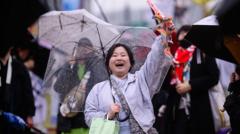South Korea is gearing up for a presidential election on June 3, prompted by the constitutional court's decision to uphold the impeachment of Yoon Suk Yeol. The acting leader, Han Duck-soo, declared the election date as the nation seeks to recover swiftly from the "wounds" inflicted by recent political turmoil.
Yoon was impeached by parliament following a controversial declaration of martial law in December, a move he claimed was necessary due to threats from domestic "anti-state forces" and North Korea. However, his declaration was widely seen as a reaction to his own political troubles rather than any genuine external threat. Yoon now faces separate charges of insurrection in a criminal court.
In announcing the election, Han extended his regrets for the confusion and anxiety that Yoon's presidency has caused over the preceding months. The political atmosphere in South Korea remains highly charged, with many calling for accountability and change.
Several politicians have already expressed their intention to run for the presidency, including former labor minister Kim Moon-soo who has officially launched his campaign. Notable figures such as Ahn Cheol-soo, from the ruling People Power Party, and opposition leader Lee Jae-myung – who narrowly lost to Yoon in the last election – are also entering the race, with current polls favoring Lee, who has garnered a 34% approval rating.
As the country emerges from this political strife, it also faces significant economic hurdles, including new tariffs established by the recent US administration, which may impact South Korean exports. The elections on June 3 may shape the future of South Korea as it grapples with both its political identity and economic stability.




















